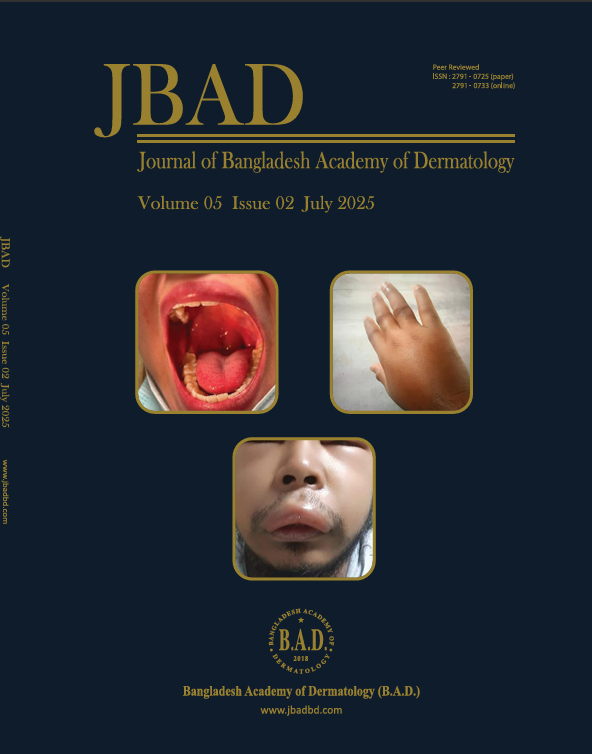Serum 25-Hydroxy Vitamin D Level in Patients with Psoriasis and its Relationship with Severity of the Disease
Abstract Background: Psoriasis is a common, chronic, immune mediated inflammatory disease. Recent studies suggest that 25-hydroxy vitamin D could have important immune modulatory effects in psoriasis. It plays a pivotal role in modulating dendritic cell function and regulating keratinocytes and T cell proliferation. Aims: To determine the serum 25-hydroxy vitamin D level in psoriatic patient and to assess its relationship with severity of the disease. Materials & Methods: This cross sectional study included 40 psoriatic patients from the department of Dermatology & Venereology, Bangabandhu Sheikh Mujib Medical University (BSMMU), Dhaka. Ethical clearance for the study was taken from the Institutional Review Board (IRB) of BSMMU. Disease severity was measured by Psoriasis Area Severity Index (PASI). Blood sample was collected from each patient & sample was preserved & analyzed for 25-hydroxy vitamin D level. Statistical analysis was carried out by using the Statistical Package for the Social Sciences (SPSS) software version 23.0. Results: Deficiency of serum 25-hydroxy vitamin D level was found in 55.5% and insufficiency in 32.5% psoriatic patients. The mean serum 25-hydroxy vitamin D level was 20.6±7.7 ng/ml and mean Psoriasis Area and Severity Index (PASI) was 14.6±5.7. There was significant correlation between serum 25-hydroxy vitamin D and PASI (r = -0.496; p= 0.001). Limitations: Small sample size was selected from single tertiary center in Dhaka city, so that the results of the study may not reflect the exact picture of the country. Conclusion: Present study revealed a negative correlation between disease activities of psoriasis with patient’s serum 25-hydroxy vitamin D concentration. So, in psoriasis serum 25-hydroxy vitamin D can be considered as a marker of disease activity. Keywords: Psoriasis, 25-hydroxy vitamin D, Psoriasis Area Severity Index (PASI) |

